01 Using reviews to build trust
Client reviews play a major role in shaping your law firm's reputation and impacting website SEO, making it easier for potential clients to find you in search engine queries.
Positive reviews also build trust and credibility with people who are seeking legal help. In fact, social proof is a concept that describes how a person's buying decisions are guided by the actions and opinions of others. Enhancing social proof is one legal marketing strategy that can dramatically influence how people feel about your law firm.
With this in mind, it's essential for law firms to take a proactive approach to client reviews. You'll want to respond to positive and negative reviews right away. Additionally, you can boost the impact of positive reviews by featuring them on your website, across social media, and other marketing channels.
02 Positive reviews boost SEO
Search engine optimization (SEO) is a set of practices used by digital marketers to increase your website's visibility in search engine results pages (SERPs).
- Technical SEO addresses sitemaps, caching, structured data, HTTP protocols, crawlability, URL structure, redirects, and page speed.
- User experience (UX) includes whitespace, font, color scheme, buttons, internal links, CTAs, contact information, intuitive navigation, photos, graphics, and mobile optimization.
- Content involves engaging information that matches user intent and informs visitors how your law firm can solve their problems.
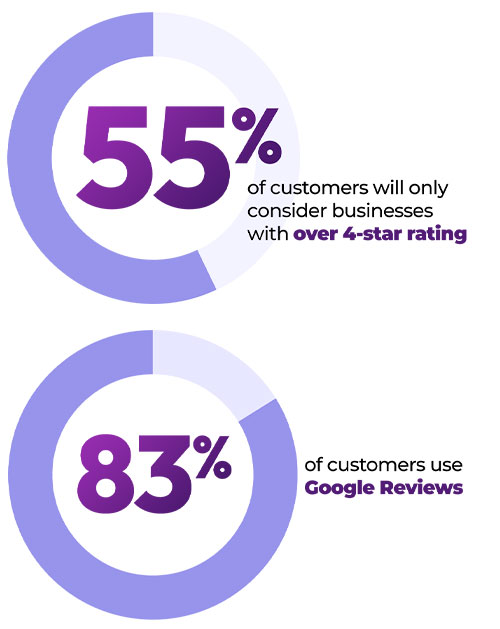
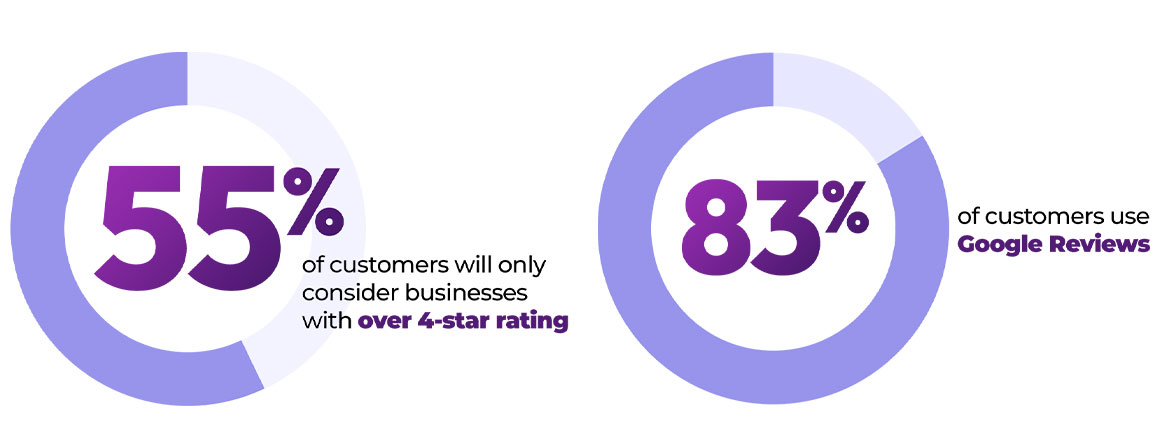
Reviews serve as endorsements, increasing search engine trust in your website. The more reviews you have, the more relevant your law firm appears to search engines. This boosts SEO, which directly impacts your visibility.
Positive reviews will also improve search rankings, making it easier for potential clients to find your firm online. Reviews can be integrated into your website, providing fresh content that search algorithms favor.
Client reviews often contain keywords that potential clients use when searching for legal services, which can significantly influence your firm's ranking on search engines. For example, when reviews mention legal terms like personal injury lawyer, criminal defense attorney, DUI, car accident, or child custody, your site becomes more visible in related search queries.
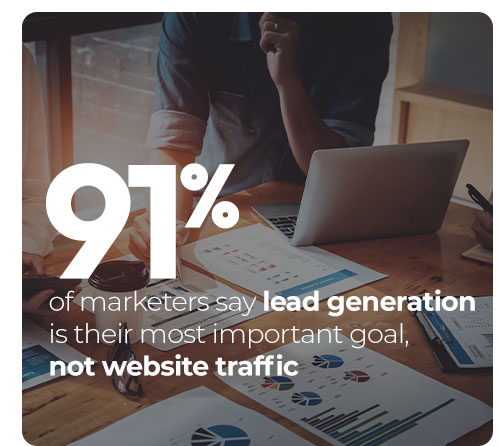
03 Turning visitors into leads
A visitor becomes a lead when they call your office or leave their contact information in your submission form. As website traffic increases, so do opportunities for generating new leads. With more people visiting your site, the positive effects begin to snowball.
- Higher visibility means more traffic to your site and a better ranking, improving visibility to potential clients.
- Increased engagement through content, such as blog posts and reviews, keeps visitors on your site longer.
- Conversion opportunities through contact forms or consultation requests give visitors more chances to turn into leads.

04 Enhancing your Google Business Profile
Google Business Profile (GBP) is a free tool that allows business owners to create a listing that will appear in Google Search and Google Maps results. Registering your business with GBP is one of the easiest and most effective things you can do to amplify your law firm's profile on the internet. Of course, positive Google reviews will make your GBP even more attractive to potential clients, improving your ranking in local search results.
05 How Google uses NPL to evaluate reviews
Natural language processing (NLP) is a branch of artificial intelligence (AI) that enables computers to understand human language. NLP helps Google determine what clients are saying about your services, their satisfaction level, and their overall experience with your firm. This can affect your search ranking, especially if the reviews consistently highlight your knowledge and success in specific legal areas.
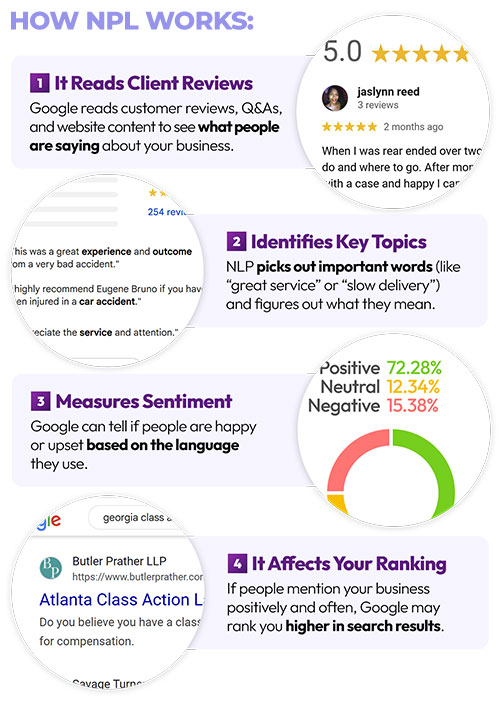
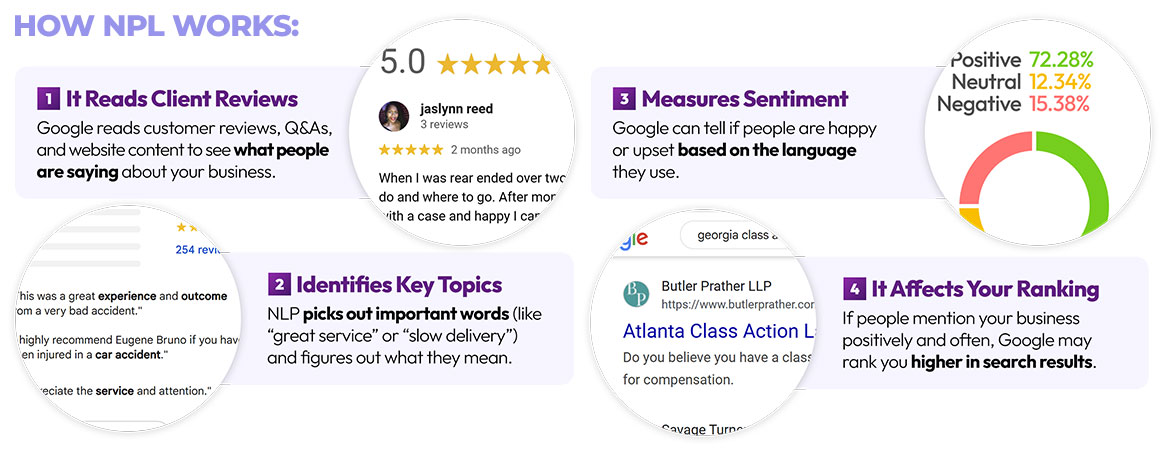
06 What are EEAT and YMYL?
EEAT and YMYL are important concepts that Google uses to evaluate websites. EEAT stands for Experience, Expertise, Authoritativeness, and Trustworthiness. Client reviews provide concrete evidence reflecting your firm's commitment to all four EEAT criteria, especially Trustworthiness.
Although EEAT applies to all types of customer queries, it is especially relevant for websites in the legal field because law firms are placed in a special Google category called YMYL, which means Your Money or Your Life. YMYL includes services that affect a person's future happiness, health, finances, or safety. Like other fields that fall under the YMYL category, law firms face a higher level of scrutiny when it comes to adherence to EEAT standards.
EEAT:
- Experience emphasizes direct personal involvement in the legal field.
- Expertise demonstrates your knowledge and skill in the legal field.
- Authoritativeness reflects your standing and recognition within the industry.
- Trustworthiness ensures that your firm is reliable and ethical in its dealings
YMYL (Your Money or Your Life):
Google Scrutinizes Websites That Impact Health, Finances, Safety, and Future Happiness.
07 The role of third-party review sites
Google naturally places a high premium on Google reviews, but they also take note of third-party reviews, such as social media platforms and other websites where clients can leave feedback about their experiences with your firm.
It's important to note that Google tends to place a higher emphasis on reviews left in authoritative sources that concentrate on the legal field, such as FindLaw, Avvo, Justia, Martindale-Hubbell, and Super Lawyers. Third-party review sites often allow for rich snippets, making your firm's information more accessible and appealing in search results. Naturally, this accessibility can lead to increased client inquiries and engagement.
08 Seeking reviews from clients

01
Keep in touch with clients using periodic emails, texts, and phone calls

02
Ask for reviews at the end of a successful case

03
Provide easy-to-follow instructions for leaving reviews

04
Incentivize reviews with follow-up services or discounts
09 Responding to client reviews
If you want to protect your firm's reputation and increase website traffic, you need to respond to positive and negative reviews as quickly as possible. Positive reviews reassure prospective clients about your credibility, trustworthiness, and the quality of the services you have to offer.
Negative reviews are painful. But when you address them publicly, they can be an opportunity to demonstrate your firm's problem-solving skills and commitment to client satisfaction. Google recommends addressing negative feedback promptly. A well-crafted response can mitigate the impact of a negative review and show potential clients that you value feedback and are willing to improve.
- Respond promptly to show clients that you value their feedback.
- Personalize your responses to negative reviews, addressing specific concerns.
- Thank your clients for their positive reviews, reinforcing the good experience they had.
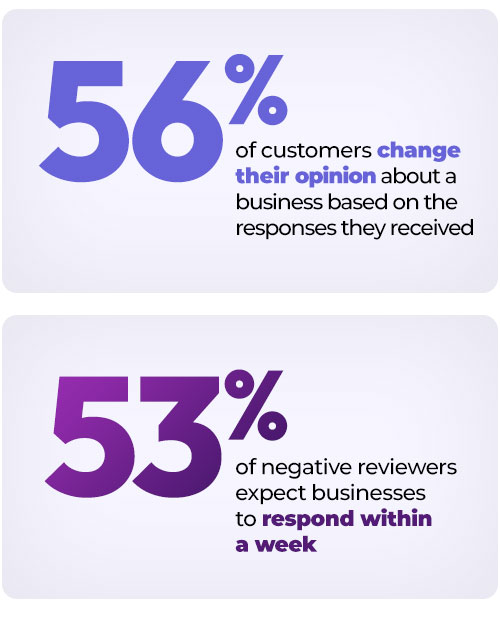

10 Tools for managing client reviews
Customer review software can automate responses and help you keep track of client feedback. These tools streamline the review management process, making it easier to maintain a positive online presence by offering a multitude of benefits.
- Automated responses save time and ensure consistency.
- Analytics provide insights into client sentiment and areas for improvement.
- Alerts notify you of new reviews, ensuring timely responses.
Here are some top client management review tools
bazaarvoice.com
PROS:
- Widely trusted platform
- Shares reviews widely
- Smart data tools
CONS:
- Very expensive
- Hard to set up
reviews.io
PROS:
- Easy Google sharing
- Works with websites
- Collects video reviews
CONS:
- Support varies
- Not beginner-friendly
- Some tech needed
housecallpro.com
PROS:
- Great for services
- Mobile app friendly
- Sends auto requests
CONS:
- Limited platforms
- Few analytics tools
Download a PDF of this Article with the full list
11 The importance of a personalized response
While automation has its advantages, personalized responses are invaluable, especially when dealing with negative reviews. A personalized approach shows clients that you care about their individual experience.
12 Maximizing the impact of positive reviews
Showcasing positive client reviews is a powerful way to strengthen your online presence and promote a positive view of your law firm. That's why you'll want to spread the good news.
Tips for maximizing the impact of positive reviews:
- Create a dedicated Reviews page on your website.
- Feature your best reviews in website headers or footers.
- Use positive reviews when crafting crafting landing pages.
- Include positive reviews in PPC advertising campaigns.
- Publicize positive reviews across social media channels.
- Share positive reviews in email marketing campaigns.
13 Conclusion
Getting the right leads to grow your business
For over 25 years, SLS Consulting, Inc., has been helping law firms across the country. Let's sit down together and discuss how we can drive more traffic to your website. Our legal websites have a conversion rate of 5-7%, which is much higher than the industry average of only 2-3%. If you're a lawyer, give us a call at (323) 254-1510 for a free digital marketing evaluation and learn more about how to grow your online presence today.
Download a PDF of this Article